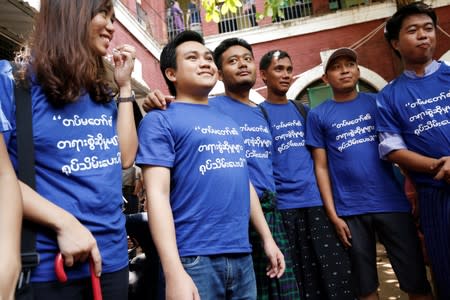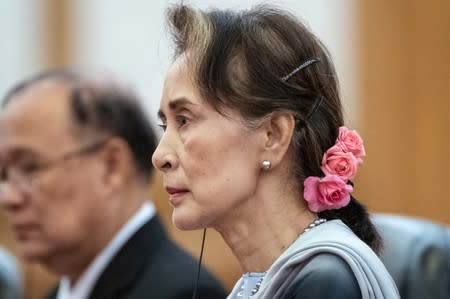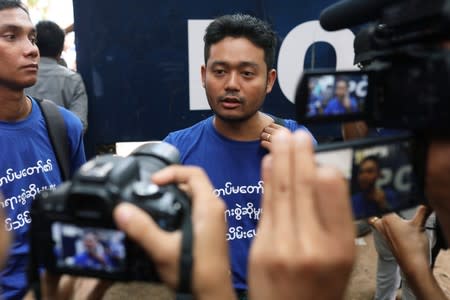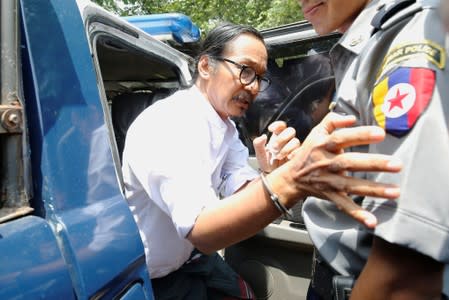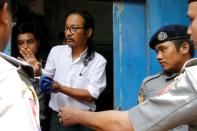As Myanmar military takes critics to court, some want Suu Kyi to act
By Shoon Naing
YANGON (Reuters) - As Min Htin Ko Ko Gyi arrived at a Yangon court recently to face charges of defaming Myanmar's military in Facebook posts, the ailing filmmaker was greeted by a crowd of activists dressed in blue, the colour of prison uniforms.
The charges against Min Htin Ko Ko Gyi - as well as against satirical performers, journalists and a Buddhist monk - have drawn criticism of government leader Aung San Suu Kyi, already facing international opprobrium over an army-led campaign against the Rohingya Muslim minority that the United Nations said constituted crimes against humanity and possibly genocide.
Some activists say the Nobel laureate, who leads a civilian administration that took power in 2016 as part of a transition after decades of harsh military rule, could legislate or at least speak out against curbs on dissent.
But others say she is hamstrung by a 2008 constitution that enshrines the military’s power and which her party is trying to amend.
Her defenders include Min Htin Ko Ko Gyi.
"No criticism should be made against Daw Aung San Suu Kyi for not getting involved in this,” the filmmaker, whose health, supporters say, is seriously deteriorating in detention, said in a statement, referring to his case.
“She is doing things that are far more important.”
Suu Kyi remains a hugely popular figure, and few doubt that her National League for Democracy (NLD) party will win most votes in a general election next year.
But in order to form the next government she must get close to matching the landslide the NLD won in 2015, a difficult feat if the party is seen as having betrayed its founding principles.
“The NLD received public support and were voted into office due to their leadership role in the pro-democracy movement, because they did what was right and not because they acted like their oppressors,” said Htuu Lou Rae Den, an organizer of an online campaign against the arrests and director of Coexist, a group promoting interfaith harmony.
The military, which retains control of key functions of the state including national security and the police, has initiated the most high-profile cases against dissent.
Soldiers have filed at least six complaints involving a dozen defendants since September last year targeting critics of the armed forces.
Min Htin Ko Ko Gyi's case stems from a complaint from an officer in March that listed 10 of the filmmaker's Facebook posts critical of the military's political role.
Brigadier General Zaw Min Tun, a military spokesman, said the armed forces needed to take legal action to prevent "misunderstandings".
"If the criticisms are fair, we have no reason to do anything," said Zaw Min Tun.
"However, if the criticisms are one-sided and not true, we will protect our own organization's dignity."
An NLD spokesman said the constitution prevented elected leaders from fully implementing their own “beliefs and policy”.
"One day when we can change the constitution so that we have a democratic federal union, these kinds of difficulties will disappear," said the spokesman, Myo Nyunt.
NEW ARRESTS
Campaigners say 25 political prisoners were released in three presidential amnesties since April, alongside thousands of other inmates.
Those released included two Reuters reporters, Wa Lone and Kyaw Soe Oo, who had been convicted under an official secrets law and jailed for seven years after they uncovered a massacre of Rohingya Muslims by soldiers and Buddhist villagers.
But activists say Suu Kyi's government has failed to use its parliamentary majority to amend draconian laws or even express opposition to the jailing of dissidents.
According to the Assistance Association for Political Prisoners human rights group, 170 people are in jail, either convicted or facing trial on politically motivated charges. Scores are on bail.
Those in prison include seven members of a satirical troupe arrested after a military officer complained about a show broadcast on Facebook during traditional New Year celebrations.
While the complaint was brought by an officer, a civilian attorney general oversees the prosecutions, said Ye Myo Hein, executive director of the Yangon-based Tagaung Institute of Political Studies.
"The government needs to stand firmly and clearly on what kind of cases will lead to lawsuits and what kind of cases are the freedom of expression," he said.
Rights activist Khin Sandar, who has taken part in the online campaign against the arrests, said the jailing of activists was galling under a government that includes many all too familiar with being locked up by the army.
“They were political prisoners once, but now they are not doing anything for political prisoners," she said.
Suu Kyi herself spent the best part of 21 years under house arrest for standing up to the military, becoming the world's most famous political prisoner.
NLD spokesman Myo Nyunt said defining who was a political prisoner was “complicated”. Additionally, some activists were “using the excuse of politics” for personal gain, he said, without elaborating.
'REVIVING THE SPIRIT’
The blue-shirted activists' campaign harks back to a one-man protest against political detentions by the late Win Tin, an NLD co-founder and journalist. He spent 19 years in prison before his release in 2008 and continued to wear a prison shirt until his death in 2014.
The young activists have also taken their protest to social media, posting and sharing images of themselves wearing blue to draw attention to political cases.
In the images, they hold up their right hand to show the name of a detainee scrawled on their palm.
The gesture is a nod to a campaign Suu Kyi took part in shortly after her release from house arrest in 2010, said Htuu Lou Rae Den.
“We're reviving the spirit of U Win Tin and pro-democracy activists who took a principled stand against injustice and oppression,” he said.
(Reporting by Shoon Naing, additional reporting by Simon Lewis; Editing by Robert Birsel)

 Yahoo News
Yahoo News 
